
Cerapteryx graminis, the antler moth, is a moth of the family Noctuidae. It is a common species throughout most of Europe but is lacking in the very dry southern regions. The northernmost occurrence is Iceland, and above the Arctic circle. It also occurs in Siberia and in North Mongolia. The species has been introduced to North America. In the Alps it rises to an altitude of 2100 meters.

Miletus symethus, the great brownie, is a small butterfly found in India that belongs to the lycaenids or blues family. The species was first described by Pieter Cramer in 1777.
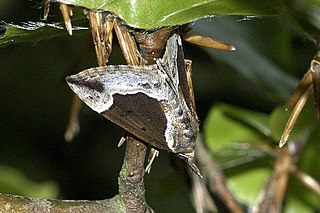
Hypena crassalis, the beautiful snout, is a moth of the family Erebidae. The species was first described by Johan Christian Fabricius in 1787. It is found in Europe.

Paectes is a genus of moths of the family Euteliidae erected by Jacob Hübner in 1818.

Paectes obrotunda is a moth of the family Euteliidae first described by Achille Guenée in 1852. It is found in Brazil. The species is only known from the female holotype. Formerly, the species was recorded from Southern North America through Central America to South America. It is also found on the Greater Antilles and Lesser Antilles. These records were based on misidentifications.

Paectes arcigera is a moth in the family Euteliidae first described by Achille Guenée in 1852. It is restricted to the eastern Caribbean Islands, ranging from Puerto Rico to the Lesser Antilles.
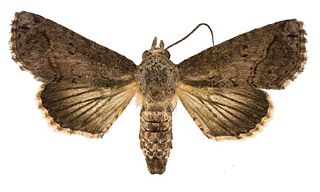
Paectes longiformis is a moth in the family Euteliidae first described by Michael G. Pogue in 2012. It is found in the north-eastern Brazilian state of Bahia.

Paectes similis is a moth in the family Euteliidae first described by Michael G. Pogue in 2013. It is found in the north-eastern Brazilian state of Pernambuco.
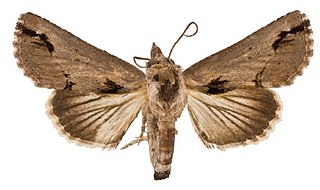
Paectes nana is a moth in the family Euteliidae. It is widespread from Florida through the Greater Antilles and from Mexico to Costa Rica. In South America, it is found in Venezuela, Colombia and northern Ecuador. It has been introduced to the Galapagos Islands.
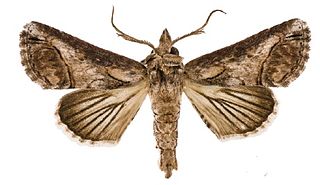
Paectes asper is a moth in the family Euteliidae first described by Michael G. Pogue in 2013. It is widespread from southern Florida and the Bahamas to the Greater Antilles, and the British Virgin Islands, U.S. Virgin Islands, and Dominica in the Lesser Antilles.
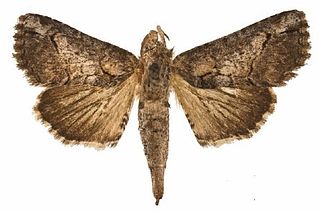
Paectes medialba is a moth in the family Euteliidae first described by Michael G. Pogue in 2013. It is found in north-western Argentina.
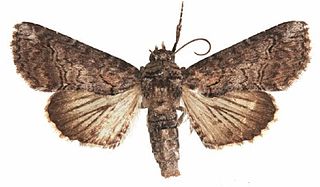
Paectes sinuosa is a moth in the family Euteliidae first described by Michael G. Pogue in 2013. It is found in the Brazilian states of Goiás and São Paulo, north-western Paraguay and the Argentine province of Tucumán.

Ogdoconta moreno is a moth in the family Noctuidae first described by William Barnes in 1907. It is only known from southern Arizona in the US, although its distribution likely extends into Mexico.
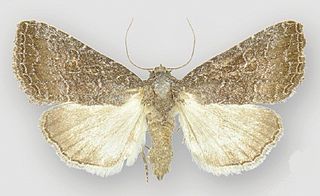
Ogdoconta tacna is a moth in the family Noctuidae first described by William Barnes in 1904. It is found in the US in central and south-eastern Texas. It is probably also present in Mexico.
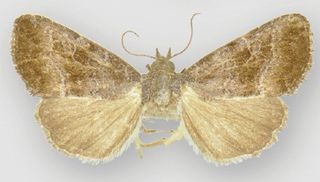
Ogdoconta fergusoni is a moth in the family Noctuidae. It is found in Florida, southern Mississippi and southern Louisiana.
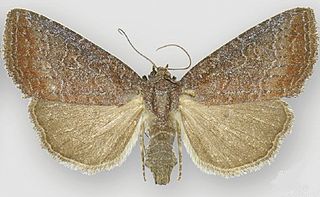
Ogdoconta rufipenna is a moth in the family Noctuidae. It is found in south-eastern Arizona. It is probably also found in Mexico.
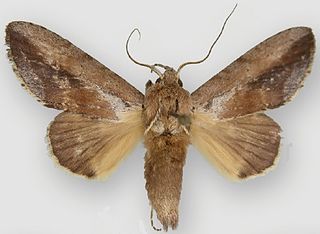
Disphragis bifurcata is a moth in the family Notodontidae first described by J. Bolling Sullivan and Michael G. Pogue in 2014. It is found from Guatemala to Colombia, probably extending south into northern Ecuador. It is found at lower altitudes and moderate elevations up to about 1,000 meters.
Paectes abrostolella is a species of moth in the family Euteliidae. It is found in North America.

Paectes oculatrix, the eyed paectes, is a moth in the family Euteliidae. The species was first described by Achille Guenée in 1852. It is found in North America.

Paectes pygmaea, the pygmy paectes, is a moth in the family Euteliidae. The species was first described by Jacob Hübner in 1818. It is found in North America.



















